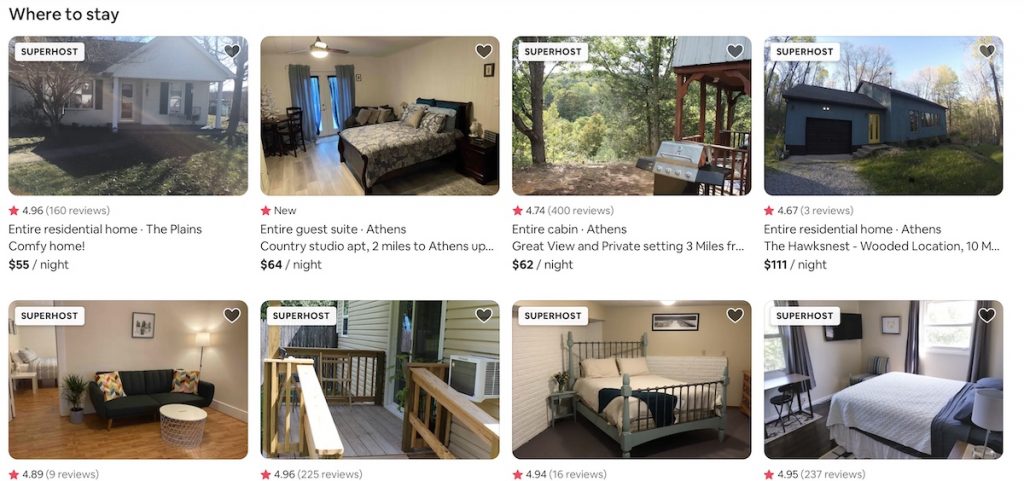News
City administrators explain how Athens’ new short-term rental ordinance will be enforced
By: David Forster
Posted on:
ATHENS, Ohio (WOUB) — One question came up again and again as the Athens City Council considered an ordinance regulating short-term rentals:
Do homeowners have to be present while renters are staying at their house?
Residents who opposed the ordinance, or had concerns about it, kept asking this question because they feared renters might behave badly and disturb the peace if the homeowner was away.
But they never got a definitive answer from the council.
Now that the ordinance has passed, it falls to city administrators to enforce it. And when asked the same question, they offered a simple answer: No.
Does this mean that homeowners can rent out their homes while they’re gone for a weekend, or on vacation for a week, or two?
“Yes, would be my answer,” said David Riggs, the city’s director of code enforcement. It’s his office that will be most responsible for enforcing the ordinance, which takes effect later this month.
Riggs isn’t sure what he’d do if he had to make sure that homeowners were home while renting to others.
“How in the world would you enforce that?” he said. “I can’t go into somebody’s house, knock on the door, ‘Are you there?’ That’s intrusive and that’s not something I think the city would want to do.”
Steve Patterson, who as mayor is the city’s chief administrator, agreed.
“To enforce the definition of present, it’s almost impossible,” he said.
The new ordinance is an attempt by the city to regulate something that’s already going on. For years local residents have been listing their homes on short-term rental sites such as Airbnb and Vrbo. There’s no law against that.
Under the ordinance, only owner-occupied homes can be used for short-term rentals in areas zoned R1, which is for single-family residences. Homeowners who want to rent short-term must get a permit from the city, which costs $150 a year, and pay the same transient guest tax paid by hotels and motels.
The ordinance defines a short-term rental as less than 30 days, and a homeowner in an R1 zone cannot rent to more than two people at a time.
To enforce the new rules, the city is contracting with a company that helps cities enforce ordinances like these. Riggs said the company will scan dozens of online short-term rental sites and provide a weekly report of any Athens homes listed. His office can then check to see if these homeowners have a permit, if the home is their primary residence, and if their rental practices are in compliance with the ordinance.
If not, his office will send them a reminder about the new rules. And if this doesn’t work, his office can send them an order to comply and enforce it by taking the homeowner to court if necessary.
The company the city is contracting with will also set up a hotline residents can call if a short-term renter is causing a problem, Riggs said.
“So we’re trying to address the underlying issue of why somebody would want to have an owner there all the time,” he said.
But the people staffing the hotline will not be able to take any immediate action. If the problem is serious, Riggs said, the police should be called.
“If it’s 2 o’clock in the morning and you can’t get to sleep, the best thing for a resident to do would be to call our police department,” he said.
A record of those calls will get passed on to the code office. If a rental is causing enough problems or is violating the terms of the ordinance, the homeowner can lose their permit and face fines.
The code office will also conduct annual health and safety inspections of short-term rental homes, just as it does with long-term rentals.

“If something went terribly wrong, the first people you’re going to have to deal with is your own neighbors, from the right to the left to across the street,” he said.
Patterson and Riggs both said they don’t expect the new ordinance will result in a lot of homeowners now deciding to do short-term rentals. But staying in a home as opposed to a motel or hotel will be an attractive option for some tourists.
Patterson mentioned in particular people coming to bike the Baileys Trail System. Storing an expensive but muddy mountain bike in someone’s garage or storage room might be more convenient than hauling it into a hotel room.
Patterson said it’s also important to note that the ordinance is not set in stone. If it turns out there are problems with it, the City Council can change it.
“At the end of the day,” he said, “there will be a learning curve on the city’s side. … I have yet to see an ordinance that was perfect from the get go here in the city of Athens.”

